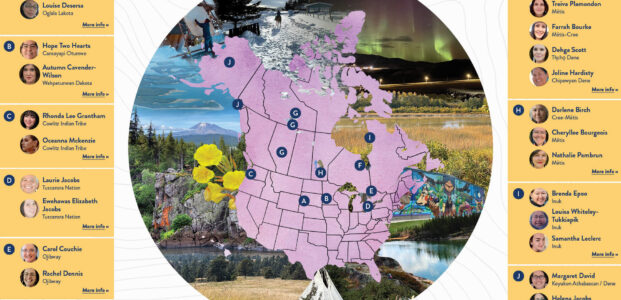Program selects Indigenous midwives and advocates to share cultural, generational knowledge
Indigenous communities experience infant mortality at nearly twice the rate in U.S. and Canada
Bozeman, MT—Twenty-seven Indigenous midwives and advocates were selected by Spirit Aligned Leadership to participate in the organization’s fifth annual knowledge-sharing program, which will highlight the importance of Indigenous midwifery.
Spirit Aligned Leadership is partnering with the National Council of Indigenous Midwives in this year’s programming. Teams of Indigenous women elders and younger Indigenous women are funded to create knowledge-sharing plans and implement community projects to promote cultural practices and approaches to Indigenous midwifery.
Learn more about the program participants and projects.
“We are honored to work with generations of Indigenous women who are committed to the health of babies and families while preserving the cultural practices that are foundational in keeping our communities whole,” said Katsi Cook, executive director of Spirit Aligned Leadership and citizen of the Mohawk Nation at Akwesasne. “These women are the keepers of ceremonies, leaders, and mentors, and the knowledge holders who pass on important health values to the next generation.”
Indigenous midwives foster a sense of trust and comfort among expectant mothers and their families by providing prenatal, birth, and postpartum care within a familiar cultural context. This can often lead to better health outcomes, including lower rates of medical interventions and increased breastfeeding rates. Additionally, Indigenous midwives play a crucial role in addressing health disparities and improving access to quality maternal care in remote and underserved areas, ultimately contributing to the overall well-being and empowerment of Indigenous communities.
“Indigenous midwifery is a movement of survival,” said Gail Small, program director of Spirit Aligned Leadership and citizen of the Northern Cheyenne Tribe. “We are up against centuries of colonization and systemic racism within healthcare systems, which have led to poorer child and infant health outcomes and a deep-seated institutional distrust. We know Indigenous midwifery saves lives and strengthens community.”
According to the National Institutes of Health, in Canada, First Nations people have nearly twice the infant mortality rate as non-First Nations people. According to the U.S. Department of Health and Human Services, American Indians/Alaska Natives have almost twice the infant mortality rate as non-Hispanic whites. And infants are 2.7 times more likely than non-Hispanic white infants to die from accidental deaths before the age of one year.
Midwifery care that includes family planning could eliminate 83% of maternal deaths, stillbirths, and infant deaths, according to the World Health Organization.
“Access to birth and reproductive healthcare is a fundamental human right, which Indigenous communities have not been afforded equitably,” said Carol Couchie, an Indigenous midwife participating in the program and a citizen of the Ojibway Nipissing First Nation. “Indigenous midwives were once crucial to every Indigenous community, and we know they can be again. We will need to see more investment into Indigenous communities from outside parties to get there.”
“We know what it takes to address the disparities—the answers are within our cultures,” said Laurie Jacobs, an Indigenous elder participating in the program, and a citizen of the Tuscarora Nation. “I am grateful to Spirit Aligned Leadership for acknowledging how important Indigenous midwives are to the health of all Indigenous communities.”
Contact:
Brad Angerman, Pyramid Communications
bangerman@pyramidcommunications.com
702-218-4490


